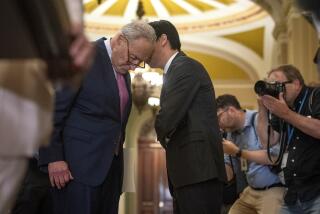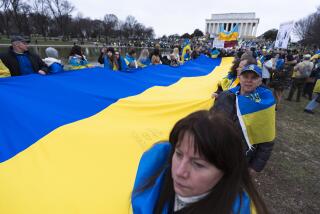Republicans in Senate Press Democrats for Vote on Iraq
WASHINGTON — Hours after President Bush on Thursday urged the United Nations to confront Iraq, Senate Republican leaders challenged Democrats to hold a rapid vote in Congress to do the same.
But Democratic leaders, while uniformly praising Bush’s speech as a powerful indictment of Saddam Hussein’s regime, remained cautious about how fast Congress should move.
The maneuvering over the timing of a congressional vote underscored how the president’s words in New York were aimed at multiple audiences--the world, the U.S. public and Capitol Hill.
While nearly all lawmakers heard the speech as a call for world action, some also heard a call for congressional action. Before Bush’s speech, the push for such a move was more muted
“We shouldn’t wait for the United Nations to act,” said Senate Minority Leader Trent Lott (R-Miss.). “We should show that we are united in our support of this president and in the goals that he has laid out. That’s part of our leadership role in the world.”
To demonstrate Republican solidarity, Lott spoke at a news conference with maverick Sen. John McCain (R-Ariz.). The two proposed a resolution that Lott said would “give the president all the authority he would need to take necessary action in dealing with this threat.”
They implied, but did not directly state, that the yet-to-be-drafted resolution would authorize the use of U.S. military force.
A congressional vote, McCain said, would give Bush the strongest possible hand as he seeks to build an international coalition to topple Iraqi President Saddam Hussein.
But senior Democrats, while applauding Bush’s speech, were noncommittal. For now, they said, a congressional vote is neither necessary nor desirable.
Sen. Joseph R. Biden Jr. (D-Del.), chairman of the Senate Foreign Relations Committee, said lawmakers should continue to gather information about the Iraqi threat and the diplomatic and military implications of a U.S.-led military strike.
“If we have a resolution next week, what’s the point of hearings?” Biden said. “Vote first, listen later? We should be deliberate about this. We should make sure the country is behind us.”
Senate Majority Leader Tom Daschle (D-S.D.) called Bush’s speech “helpful”--but not conclusive. He said major questions remained unanswered, among them how the world would react to the Bush initiative, how a military strike on Baghdad would affect the war on terrorism and what sort of regime would replace Hussein.
“I don’t think that the case for a preemptive attack has been made conclusively yet,” Daschle said. “That doesn’t mean it can’t be made.”
Daschle also said lawmakers should consider whether focusing on the Iraqi issue before the Nov. 5 elections would inject an overly political element into a major national security issue.
Aspects of Bush’s speech won positive reviews across the board, from doves, hawks and the many in between.
Those in Congress who have been urging a go-slow approach on authorizing action against Iraq--many Democrats, some Republicans--applauded what they heard as a move to gather international support.
For now, these lawmakers say, the ball is in the U.N.’s court.
“I believe the president should go through a process,” said Rep. Martin T. Meehan (D-Mass.). “He now has begun to do that.”
Meehan added: “People don’t want to go to war. They want the administration to conduct diplomacy.”
Rep. John P. Murtha of Pennsylvania, a leading Democrat on defense matters who helped the president’s father, President George Bush, gather congressional support in 1991 for the Persian Gulf War, said the appeal to the U.N. would earn goodwill among congressional skeptics.
“We’re moving in the right direction now,” Murtha said. The president, he added, “is starting to realize we can’t do this by ourselves.”
Another lawmaker who has been undecided about the need for military action against Iraq, Sen. Larry E. Craig (R-Idaho), predicted that Bush’s speech would move world and congressional opinion.
“President Bush clearly laid out the conditions Saddam Hussein can follow to avoid conflict,” Craig said. “Should Iraq defy these conditions, I believe you will see the pendulum of the international community, and Congress, swing toward calling for some form of action against Iraq.”
Other Republicans who have been cautious about the use of military force, such as House Majority Leader Dick Armey of Texas, also applauded the speech.
“We’re saying to the United Nations, ‘Defend your own honor,’ ” Armey said.
For those who have been most hawkish on Iraq, such as House Majority Whip Tom DeLay (R-Texas), the speech marked another step toward a goal they believe is long overdue: ridding the world of the threat of an unstable dictator who controls weapons of mass destruction.
“The president used strong moral leadership to underscore the grave dangers that would follow an abdication of responsibility by the United Nations,” DeLay said. “The U.N.’s credibility is on the line.”
More to Read
Get the L.A. Times Politics newsletter
Deeply reported insights into legislation, politics and policy from Sacramento, Washington and beyond. In your inbox three times per week.
You may occasionally receive promotional content from the Los Angeles Times.










